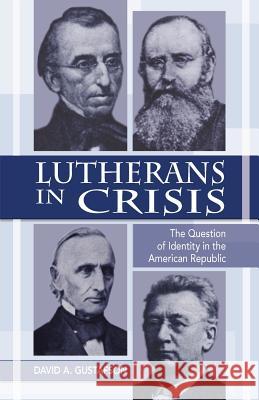Lutherans in Crisis Op » książka
Lutherans in Crisis Op
ISBN-13: 9780800626594 / Angielski / Miękka / 2010 / 194 str.
The first complete account in English of the American Lutheran controversy of 1849-1867 Tension between a religion's heritage and its social context forms the everpresent question of group identity. In the United States, this question has been posed in a particular way for religious traditions as the tension between "Americanization"-being assimilated into social and cultural structures of the new world-and "confessional identity"-seeking to sustain and understand a religious heritage in light of a new context and its questions. Lutherans in the mid-nineteenth century provide one illustration of this social and theological tension. The first part shows how, in spite of Henry Melchior Muhlenberg's efforts, early Lutheranism adopted congregational polity, democratic structures, voluntary membership, and freer liturgical forms. Then the formation of the General Synod (1820) is traced and its chief spokespersons and their theological and practical innovations highlighted. Gustafson locates the movements toward confessional revival among Lutherans in Germany-many of whom emigrated to the United States in the 1830s-in reaction to unification with the Reformed. The final chapters chart the actual controversy (1849-1867) between the less confessional Lutherans of the General Synod and the recent, more confessional Lutheran immigrants. "Gustafson shows that Lutherans today can learn a lesson from the nineteenth-century struggle for Lutheran identity. The confessional Lutheran part issued a 'call to faithfulness' at a time when major voices were inviting Lutherans to join the melting pot of American Protestantism. Lutherans still stand at a crossroads between Protestantism and Catholicism, caught in the struggle over their own identity and mission. Lutherans in Crisis sheds the light of our past on the path of our future. Without this light we would be completely in the dark." -Carl E. Braaten Lutheran School of Theology David A. Gustafson, who received his PhD from the Graduate School of Union Institute, served elca parishes in Wisconsin for most of his career. At the time of his death in 2001, he was teaching Church History at the University of Saint Thomas in Saint Paul, Minnesota.











